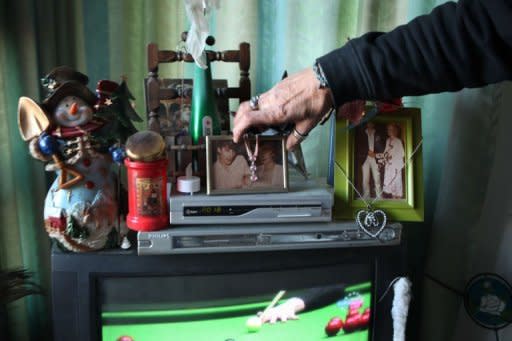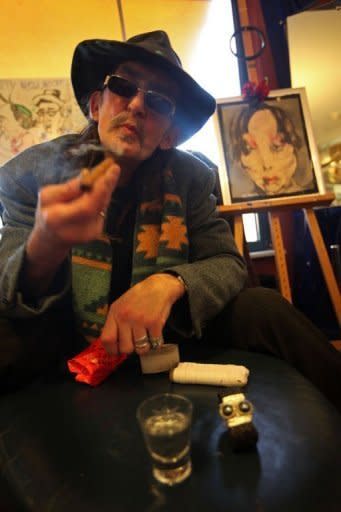Elderly junkies find 'freedom' at Dutch old-age home
In a tiny fourth-floor room overlooking The Hague's city centre, a grey-haired man carefully plugged a small pipe with a ball of cocaine, lit up and drew a deep breath. "This is real freedom," said 65-year-old William as a billow of white smoke poured from his nostrils and wafted through his apartment at Woodstock, the only Dutch home for elderly junkies and other addicts. The apartment block, flanked by a canal and a tram line, takes a unique approach to drug abuse by helping to keep ageing homeless people off the city's streets and out of trouble with the law. "I like it here. Here there is no police watching you," William told AFP as he rearranged the paraphernalia of his addiction on a small table: a pipe, a lighter, a mirror with traces of cocaine lines and an old credit card. "I can do what I want to do." His hard-luck story is similar to that of the 32 other "older" drug and alcohol-dependent residents, including three women, who live at Woodstock, a drab brown apartment block a stone's throw from the city centre. After 33 years of hard living in Spain, where he picked up a cocaine habit while working in hospitality, William returned to the Netherlands two years ago, hoping to rebuild contact with his estranged family. But instead of enjoying a reunion, he was viciously attacked by two youths at a local homeless shelter, receiving a beating that cost him his left eye and which left part of his face paralysed. His other wounds healed, but William was still out on the street. He eventually ended up at Woodstock's doors and has been living there ever since. Named after hippiedom's most famous festival, Woodstock opened in December 2008 as a combined project between The Hague's municipality and the local health provider Parnassia. "We identified a great need in the city to help 'older' drug addicts, aged between 45 to as old as 70, who were homeless," said Nils Hollenborg, the home's manager and resident psychiatrist. But he stressed: "We are not here to try and rehabilitate our residents. "In fact, our criteria state you can only get into Woodstock if you're over 45 and after a medical examination declares you are beyond rehabilitation." "What we do here is give people a roof over their heads, a stable home and something to eat for free -- and we tolerate limited use of hard drugs." Many of Woodstock's residents also take prescription methadone, the synthetic drug used in programmes around the world to treat opiate addiction, which like accommodation and food, is handed out for free. But alcohol and illegal drugs, such as cocaine and heroin -- or cannabis, of which small amounts are officially tolerated by the Dutch government -- have to be bought outside and off the street. "Our approach to drug abuse, targeting this particular group of people, makes us unique in the Netherlands," Hollenborg said. The Woodstock home for ageing addicts in many ways resembles other frail-care facilities in the Netherlands, although it has some special touches. At the entrance hall, the occasional visitor is greeted by a life-sized statue of screen legend Humphrey Bogart standing guard. Behind the reception desk, pop art prints of another Hollywood icon, Marilyn Monroe, smile down on a hall equipped with a pool table, a jukebox and a cage that houses exotic parrots. Only a white board in the locked staff room with residents' names and their daily dozes of prescribed methadone hints at the home's special purpose. Funding came mainly through a Dutch insurance law providing for special health care needs, Hollenborg said. Since its inception, the project has been part of the city's success in bringing down petty crime figures in the centre, said Sjoerd Steenbergen, spokesman for the council's health services representative. "A few years ago elderly drug addicts accounted for nine percent of petty crime. It's dropped down to five," he told AFP. Asked if he used the methadone programme, Tony, 65, a resident of the past 18 months, shook his head, tapped a beer can in his pocket and said with a gravelly voice: "I have my poison right here. This and smoking cigars." Upstairs in his threadbare room, with a single bed, kitchen sink and kettle, Tony proudly pointed at a small flatscreen TV which he said he bought with money made by pushing shopping trolleys at a mall in an affluent suburb. Next to his bed were a picture he had painted himself and a figure of Jesus Christ on a cross. In his fridge stood a solitary beer, awaiting the fate of countless empty cans in the dustbin. Back downstairs, in a room livened up with a a fish tank and a portrait of David Bowie, he said as he puffed on a cigar and fingered the beer in his pocket: "I do want to get out of here." Then Tony remembered how he recently celebrated his 65th birthday with a small party thrown by Woodstock's 30-odd staff, among them nurses, helpers, social workers and administration personnel. "Then again," he said as the ember on his cigar glowed a bright orange, "I may just be here until I'm 90."




